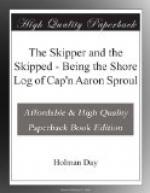“Turn round, you devilish idjit?” bellowed the Cap’n. “What do you think this is—one of your circus wagons with a span of hosses hitched in front of it? I told you once before that I didn’t want to be bothered with conversation. I tell you so ag’in. I’ve got things on my mind that you don’t know anything about, and that you ain’t got intellect enough to understand. Now, you shut up or I’ll kick you overboard for a mutineer.”
At the end of half an hour of silence—bitter, suffering silence—Hiram broke out with a husky shout.
“There ye go, Cap’n,” he cried. “Behind you! There’s our chance!”
A wavering red flare lighted the sky, spreading upward on the mists.
The men forward raised a quavering cheer.
“Ain’t you goin’ to sail for it?” asked Hiram, eagerly. “There’s our chance to get ashore.” He had crept close to the skipper.
“I s’pose you feel like puttin’ on that piazzy hat of yourn and grabbin’ your speakin’-trumpet, leather buckets, and bed-wrench, and startin’ for it,” sneered Cap’n Sproul in a lull of the wind. “In the old times they had wimmen called sirens to coax men ashore. But that thing there seems to be better bait of the Smyrna fire department.”
“Do you mean to tell me that you ain’t agoin’ to land when there’s dry ground right over there, with people signallin’ and waitin’ to help you?” demanded the showman, his temper whetted by his fright.
The Cap’n esteemed the question too senseless to admit any reply except a scornful oath. He at the wheel, studying drift and wind, had pretty clear conception of their whereabouts. The scraggly ridge dimly outlined by the fire on shore could hardly be other than Cod Lead, where Colonel Gideon Ward and Eleazar Bodge were languishing. It was probable that those marooned gentlemen had lighted a fire in their desperation in order to signal for assistance. The Cap’n reflected that it was about as much wit as landsmen would possess.
To Hiram’s panicky mind this situation seemed to call for one line of action. They were skippered by a madman or a brute, he could not figure which. At any rate, it seemed time to interfere.
He crawled back again to the huddled group of the Ancients and enlisted Ludelphus Murray, as biggest and least incapacitated by seasickness.
They staggered back in the gloom and, without preface or argument, fell upon the Cap’n, dragged him, fighting manfully and profanely, to the companionway of the little house, thrust him down, after an especially vigorous engagement of some minutes, slammed and bolted the doors and shot the hatch. They heard him beating about within and raging horribly, but Murray doubled himself over, his knees against the doors, his body prone on the hatch.
His position was fortunate for him, for again the Dobson jibed, the boom of the mainsail slishing overhead. Hiram was crawling on hands and knees toward the wheel, and escaped, also. When the little schooner took the bit in her teeth she promptly eliminated the question of seamanship. It was as though she realized that the master-hand was paralyzed. She shook the rotten sail out of the bolt-ropes with a bang, righted and went sluggishly rolling toward the flare on shore.




